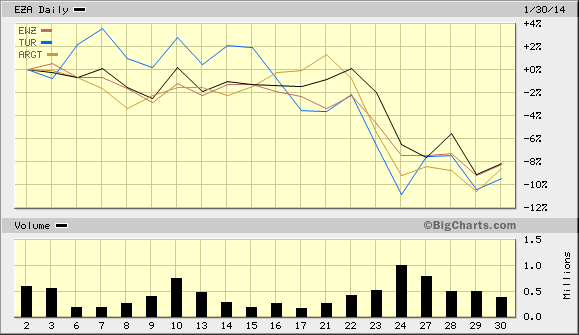January hasn’t been kind to emerging markets. Political crisis in Turkey and Argentina and election politics in South Africa have combined with fears over Fed tapering to create the perfect storm.
The root of the problem? Current account deficits. Turkey, South Africa, Argentina and Brazil all have large current account deficits. And all else equal, a country that persistently imports more than it exports will see its currency weaken. Of course, all else is rarely equal, and large capital inflows in the form of direct investment and portfolio investment can cause a country’s currency to remain strong even in the face of persistent deficits. This was certainly the case for the United States during the “strong dollar” days of the late 1990s. But when those capital inflows reverse—as they are today in emerging markets—look out below.
A country with a floating exchange rate has few good options to stop a currency rout. You can try to prop up your currency by intervening directly, but generally all this accomplishes is depleting foreign reserves. Your only other real option is to hike your central bank’s benchmark rate…which of course risks causing a recession.
This is the bind that Turkey and South Africa in particular currently find themselves in. Both countries ostensibly raised rates this week, but it didn’t impress the market. In the case of South Africa, the move was deemed too small to matter, and in the case of Turkey, it was viewed as being dishonest, as Turkey uses multiple benchmark rates.
So, with all of this said, are emerging markets a short?
No. With the exception of Brazil, virtually all emerging markets have currencies that are now significantly underpriced as measured by purchasing power parity. Emerging market stocks are also under owned by both retail and institutional investors, and—perhaps most importantly—they are much cheaper than developed markets.
Can cheap assets get cheaper? Of course. But in my view, it makes sense to start accumulating select emerging markets on any pullbacks. My favorite? South Africa.
Action to take
Initiate a small initial position in the iShares South Africa ETF (EZA) equal to about 50% of the total amount you would normally invest in a speculative position. Add to the position on any dips in 5%-10% increments until fully invested. Plan to hold for the next 12-18 months for what I expect to be 30%-40% gains.





